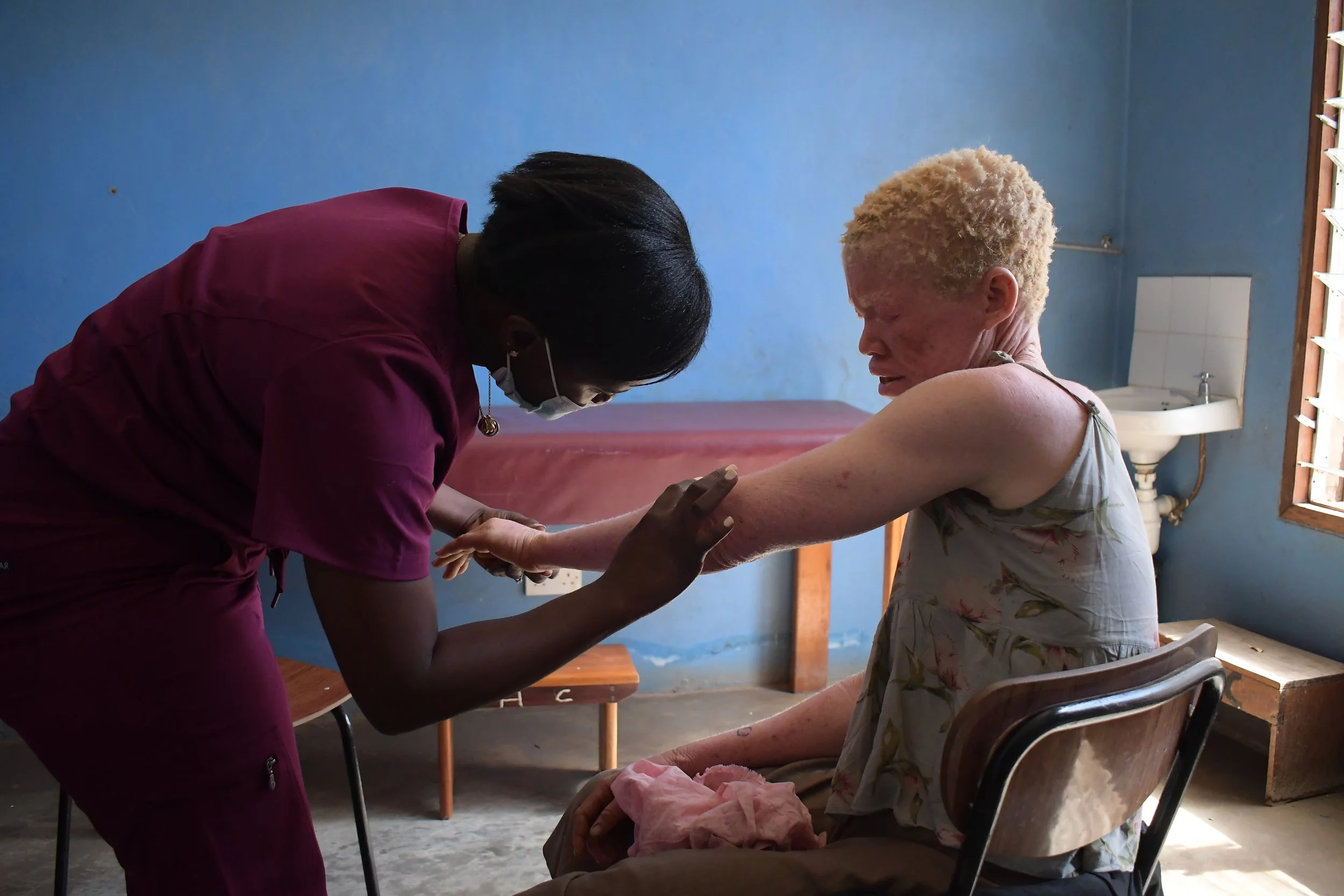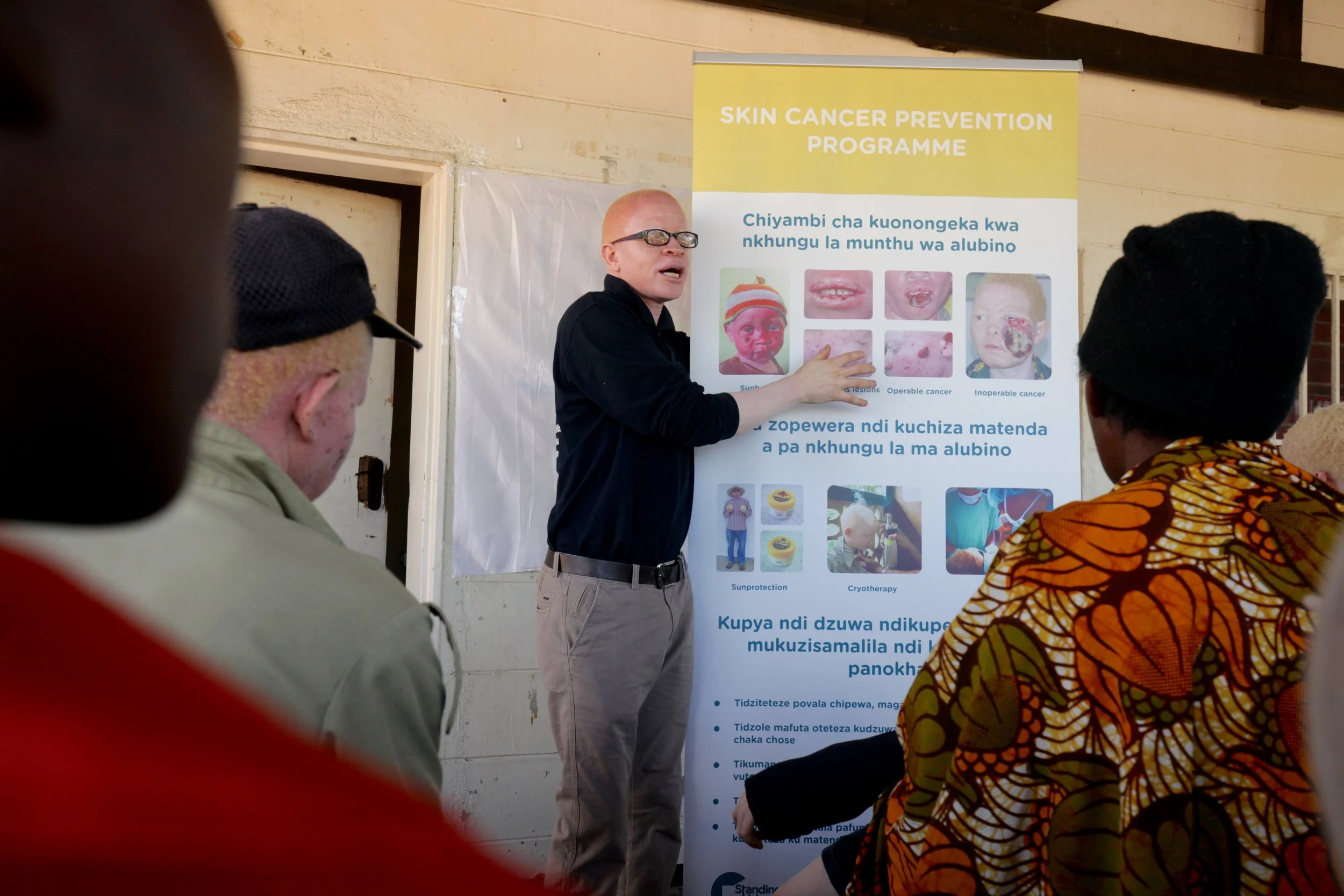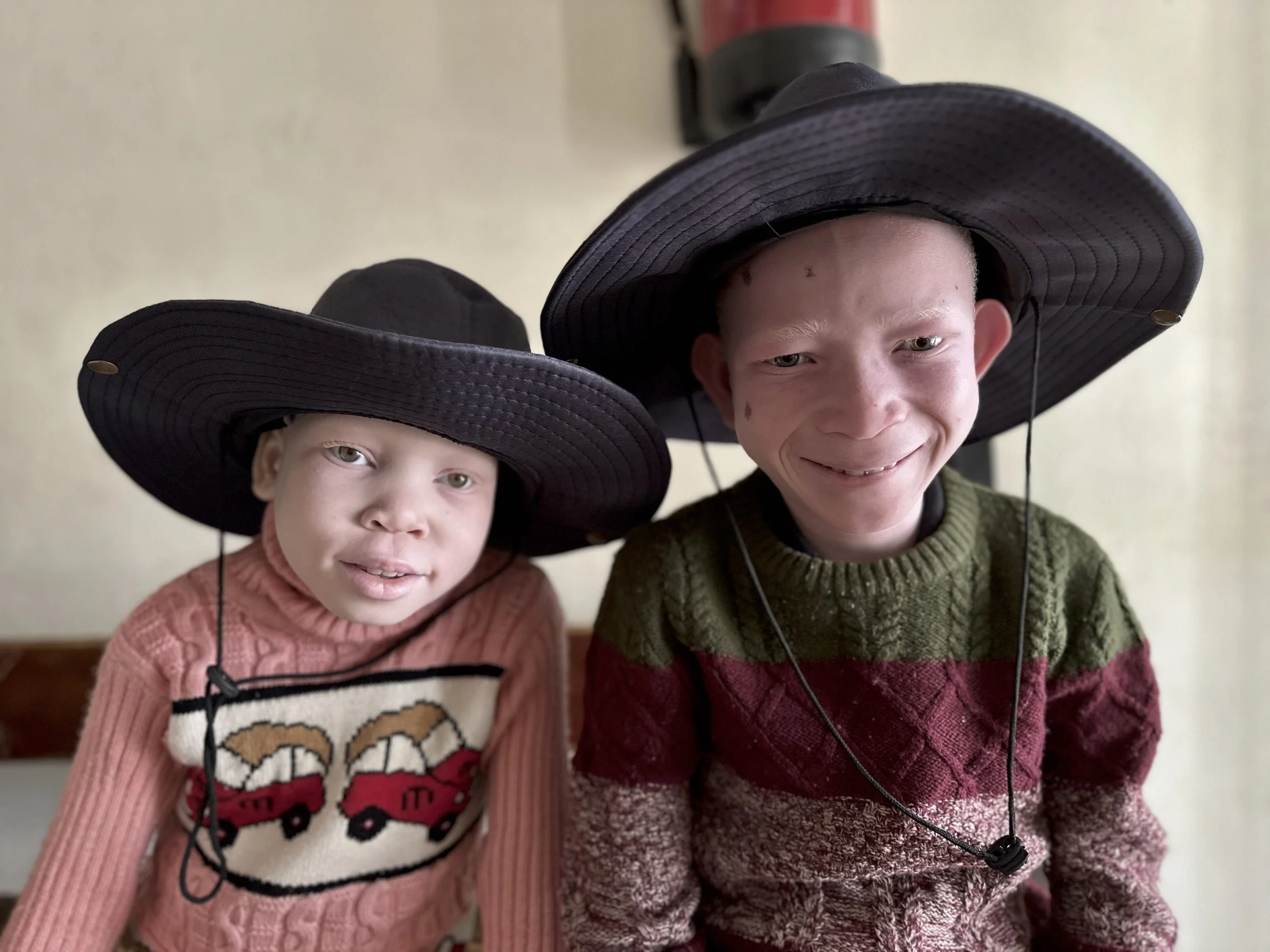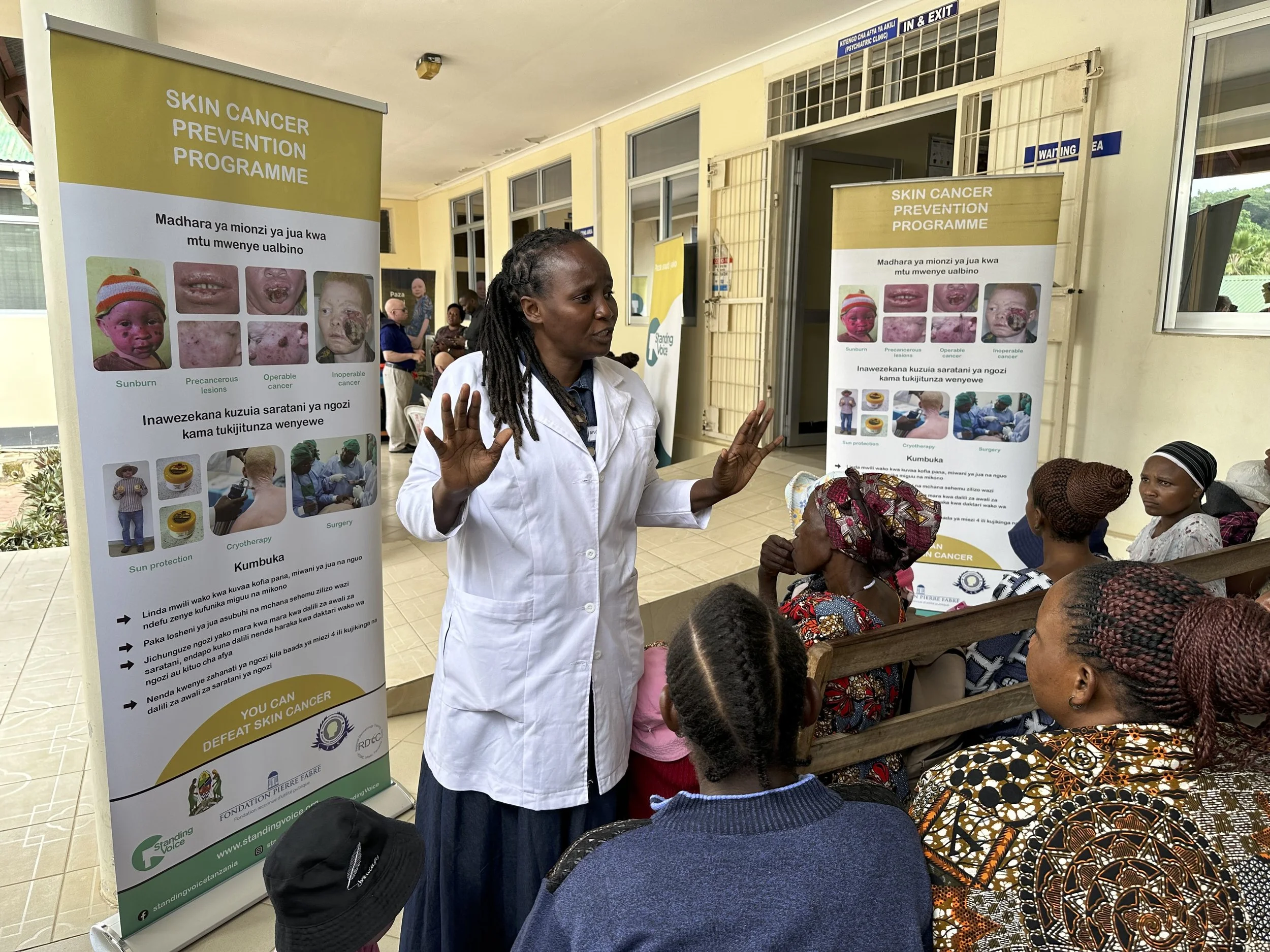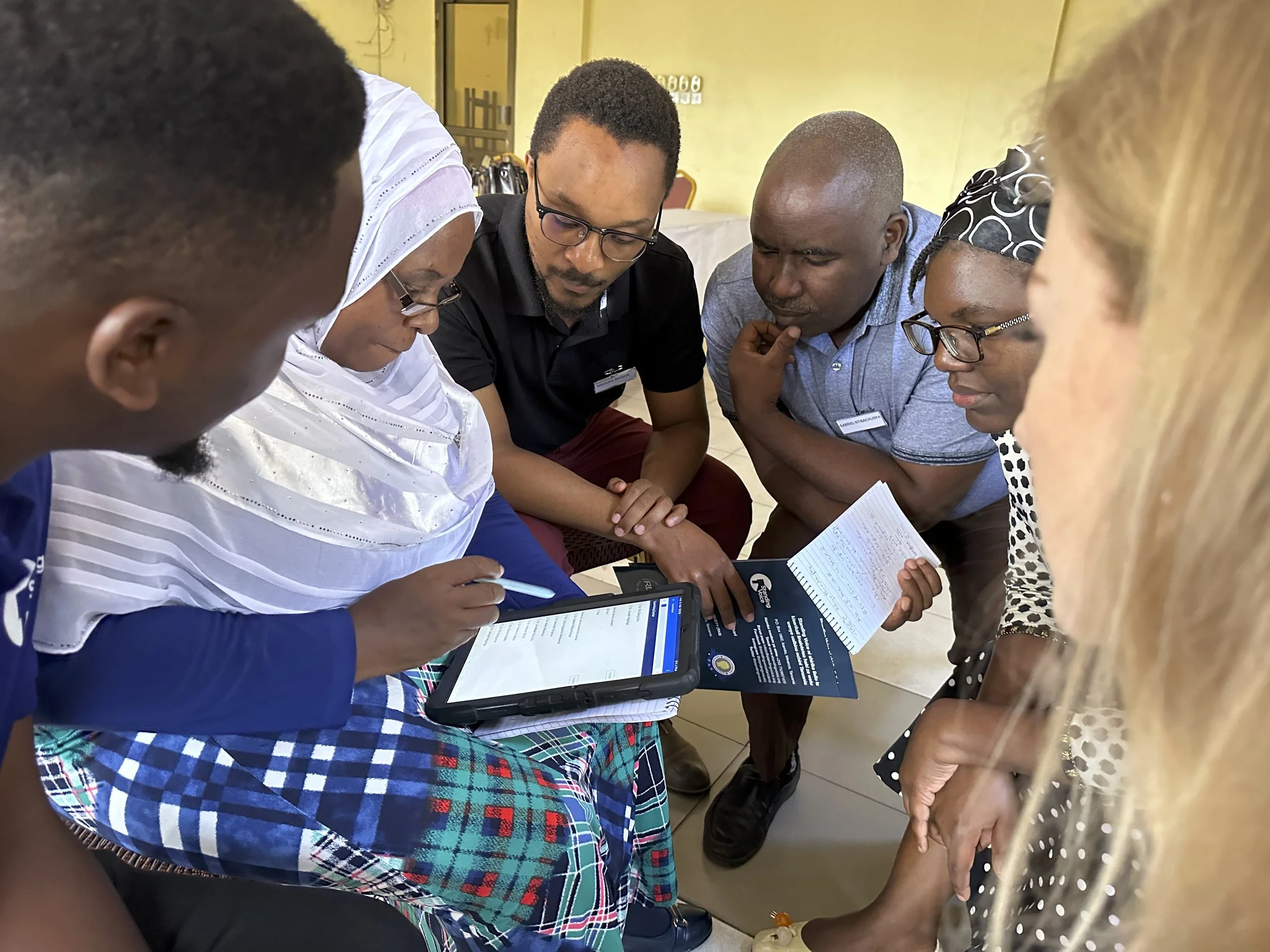SKIN CANCER PREVENTION

Overview
Albinism is not—and should never be—a death sentence. Yet with little melanin to protect the skin, limited access to dermatological care, and scarce resources such as sunscreen, people with albinism in Africa are dying young due to the blistering tropical sun. Skin cancer remains their silent—and greatest—killer.
To confront this crisis, Standing Voice launched its Skin Cancer Prevention Programme (SCPP) in 2013. In close partnership with the Ministry of Health, this decentralised network of dermatology clinics now reaches over 13,000 people with albinism across more than 300 hospitals and health centres in Tanzania and Malawi. Embedded within primary healthcare systems and led by local health workers, the programme delivers skin screening, health education, cryotherapy, minor surgery, and referrals for advanced treatment when needed. Every clinic also provides regular supplies of sunscreen, sun hats, and sunglasses.
Our goal is to support governments and civil society in building national, scalable programmes of skin cancer prevention and treatment that reach every person with albinism. Recognised as best practice by the United Nations Independent Expert on Albinism in 2016, the SCPP today stands as the largest initiative of its kind worldwide, dedicated specifically to serving persons with albinism.
The SCPP is delivered in partnership with the Governments of Tanzania and Malawi, with the long-term financial and technical support of the Pierre Fabre Foundation, Croda Foundation, and European Commission. Standing Voice will continue this mission until every person with albinism in Tanzania and Malawi is protected from this entirely preventable disease.
Jump ▿
How It Works
Manual of Best Practice
Useful Resources
Partners
1,000 TIMES MORE LIKELY FOR PEOPLE WITH ALBINISM IN AFRICA TO DEVELOP SKIN CANCER
Endorsed as ‘best practice’ by the United Nations
How It Works
Embedded in the health systems of Tanzania and Malawi, the Skin Cancer Prevention Programme (SCPP) trains a wide range of stakeholders to play their part in preventing skin cancer among people with albinism:
-
We train Dermatology Officers, Clinicians, Medical Assistants, and Surgeons to lead skin cancer prevention and treatment services for people with albinism, operating in hundreds of health facilities in Tanzania and Malawi.
-
We empower and support albinism associations to map their members, advocate for their rights, and connect them with essential health services
-
We build the capacity of social workers, health surveillance assistants, and civil society advocates to connect people to clinics and ensure their wellbeing between care cycles
-
Govts assign public-sector health workers to receive training and lead skin cancer prevention services for people with albinism in their facilities.
-
We train patients, their families and their caregivers to identify early signs of skin cancer and report lesions of concern immediately to our team
-
We partner with the Regional Dermatology Training Centre, referral hospitals and a network of international specialists to train health workers in the prevention and management of skin cancer in people with albinism
-
We train and support community tailoring groups, led by women impacted by albinism to produce wide-brimmed sun hats, which are distributed through the Skin Cancer Prevention Programme’s clinical network.
This registered social enterprise is manufacturing over 18,000 hats annually, providing essential sun protection to people with albinism across Tanzania and Malawi.
-
Since 2013 we have funded the local production of sunscreen at the Kilimanjaro Sunscreen Production Unit at KCMC in Moshi Tanzania.
We work closely with International Sunscreen manufacturers, which include Altruist, Pierre Fabre Foundation, Beyond Suncare, Entekno, ISDIN and African Albinism Foundation who donate sunscreen to Standing Voice which is distributed free to persons with albinism through the Skin Cancer Prevention Programme.
THE MAJORITY OF PERSONS WITH ALBINISM IN AFRICA DEVELOP SKIN CANCER BEFORE AGE 40
Clinics operate in hundreds of Government hospitals and health centres throughout Tanzania and Malawi: a network of locations that puts thousands of people with albinism within easy reach of essential healthcare. Upon arrival, patients are registered into a digital health information system using a unique ID. People with albinism and their families partake in health education sessions about albinism and skin cancer, before receiving informational resources and sun-protective items including hats, umbrellas, sunglasses, and SPF-50+ sunscreen.
Each person receives a one-to-one consultation and skin examination from a community based dermatologist, who collects detailed information on their medical history and sun protection habits before diagnosing and treating any precancerous lesions. Cryotherapy and minor surgery are delivered on-site, while complex cases requiring major surgery, chemotherapy or radiotherapy are referred to specialist hospitals. Referred patients receive ongoing support during treatment, and we work with dermatology departments to process biopsy results and organise after-care. In cases where a diagnosis is terminal, we work with people with albinism, their families and a network of specialist partners to provide palliative care support.
We also operate a toll-free helpline in Tanzania and Malawi, so people with albinism can contact us directly for advice and remote consultation.
In Focus: Manual of Best Practice
The SCPP is driving systemic change in Africa by strengthening the capacity of health workers to prevent, diagnose and treat skin cancer in people with albinism.
Through clinical training workshops we’ve equipped hundreds of health workers with practical, life-saving skills. To support this training and standardise best practice, we have developed a toolkit, including publishing the first-ever internationally recognised Manual of Best Practice in Dermatological Care for People with Albinism in Africa.
Developed in partnership with the International Foundation for Dermatology and funded by the International League of Dermatological Societies, Novartis, and the Pierre Fabre Foundation, the manual is tailored to the African context and designed to support learning for dermatology officers, surgeons, clinical officers and nurses, consolidating current knowledge and promoting excellence in dermatological care for people with albinism.
Authored by medical experts from Tanzania, Malawi, the UK, the USA, and Spain, the manual was led by Dr Andrew Sharp, Chair of the Standing Voice Medical Advisory Board. This board guides the clinical direction of the Skin Cancer Prevention Programme and oversees its training provision.
The manual is available in English and French and has been distributed to health workers across ten African countries - Tanzania, Malawi, Uganda, Zimbabwe, Rwanda, Togo, Côte d'Ivoire, Burkino Faso, Mali and Niger.
Download a copy of the manual HERE.
Useful Resources
Manual of Best Practice
A guide to skin cancer prevention and management for people with albinism in Africa, Funded by the ILDS.
Information booklet for PWA, Families and Caregivers
Our purpose-built guide to increase knowledge on albinism
With thanks to our programme funders










